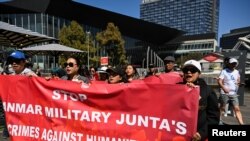ຄວາມພະຍາຍາມຂອງນານາຊາດ ເພື່ອໂດດດ່ຽວລະບອບການປົກຄອງຂອງ ທະຫານໃນມຽນມາ ປາກົດວ່າ ໄດ້ເຮັດມີຜົນກະທົບຕໍ່ຄວາມສາມາດໃນການຊື້ອາວຸດຍຸດໂທປະກອນໃໝ່ຈາກຕ່າງປະເທດ ແຕ່ຝ່າຍທະຫານກໍຍັງສາມາດ ເຂົ້າເຖິງແຫລ່ງເງິນ ແລະອາວຸດຕ່າງໆໄດ້ ສຳລັບການເຮັດສົງຄາມຂອງຕົນ ກັບກອງກຳລັງຕໍ່ຕ້ານການກໍ່ລັດຖະປະຫານ ນັກຊ່ຽວຊານຂອງອົງການສະຫະປະຊາຊາດ ໄດ້ກ່າວໃນລາຍງານສະບັບນຶ່ງທີ່ໄດ້ຖືກພິມອອກເຜີຍແຜ່ໃນ ວັນພຸດວານນີ້.
ມຽນມາ ໄດ້ຕົກລົງສູ່ຄວາມວຸ້ນວາຍນັບຕັ້ງແຕ່ຝ່າຍທະຫານໄດ້ຍຶດອຳນາດ ຈາກລັດຖະບານທີ່ຖືກເລືອກຕັ້ງຂຶ້ນມາ ໂດຍການກໍ່ລັດຖະປະຫານໃນປີ 2021 ເຊິ່ງໄດ້ກະຕຸ້ນໃຫ້ມີການວາງມາດຕະການລົງໂທດທາງດ້ານການເງິນຕໍ່ຝ່າຍທະຫານ ເຊັ່ນ ບັນດາທະນາຄານ ແລະທຸລະກິດທີ່ກ່ຽວຂ້ອງອື່ນໆ ໂດຍປະເທດຕາເວັນຕົກ.
ຫຼາຍກວ່າສາມປີຜ່ານມານີ້ ຂະບວນການປະທ້ວງຕໍ່ຕ້ານການກໍ່ລັດຖະປະຫານ ໄດ້ວິວັດທະນາການເຂົ້າສູ່ສົງຄາມກາງເມືອງຢ່າງເຕັມຮູບແບບກັບຝ່າຍທະ ຫານ ທີ່ໄດ້ຖືກກ່າວຫາວ່າເປີດສາກໂຈມຕີທາງອາກາດຕໍ່ຝ່າຍຕໍ່ຕ້ານທະຫານ ແລະພົນລະເຮືອນທັງຫຼາຍເຊັ່ນດຽວກັນ ຂະນະທີ່ຕົນສູນເສຍການຄວບຄຸມພື້ນທີ່ ເຂດແດນອັນກວ້າງໃຫຍ່.
ລາຍງານໂດຍນັກຂ່າວພິເສດຂອງສະຫະປະຊາຊາດ ກ່ຽວກັບສະຖານະການ ດ້ານສິດທິມະນຸດໃນມຽນມາ ກໍຄື ທ່ານ ທອມ ແອນດຣູສ໌ ນັ້ນ ໄດ້ພົບເຫັນວ່າ ມູນຄ່າຂອງອາວຸດທັງຫຼາຍ, ການໃຊ້ເທັກໂນໂລຈີໃນສອງຮູບແບບ, ການຜະລິດອຸປະກອນ ແລະ ການນຳເຂົ້າວັດຖຸຕ່າງໆໂດຍລັດຖະບານທະຫານ ລວມທັງໝົດແລ້ວ ສູງເຖິງ 253 ລ້ານໂດລາ ໃນປີດັ່ງກ່າວຈົນເຖິງເດືອນມີນາ 2024.
ບົດລາຍງານດັ່ງກ່າວ ໄດ້ລະບຸວ່າ ມູນຄ່າອັນນັ້ນ ໜ້ອຍກວ່າປີກ່ອນເຖິງ ນຶ່ງສ່ວນສາມ ເນື່ອງຈາກຄວາມພະຍາຍາມຂອງປະເທດສິງກະໂປ ໃນການ ປ້ອງກັນບໍລິສັດຕ່າງໆບໍ່ໃຫ້ການຊ່ອຍເຫຼືອແກ່ລັດຖະບານທະຫານ.
International efforts to isolate Myanmar's ruling junta appear to have dented its ability to purchase new military equipment from overseas, but the military is still able to access money and weapons for its war against anti-coup forces, a U.N. expert said in a report published on Wednesday.
Myanmar has been plunged in turmoil since the military seized power from an elected government in a 2021 coup, which sparked financial sanctions imposed on the military, banks and other associated businesses by Western countries.
More than three years on, a protest movement against the coup has evolved into a full-blown civil war, with the military accused of launching air strikes on insurgents and civilians alike as it has lost control of large swathes of territory.
A report by the U.N. special rapporteur on the situation of human rights in Myanmar, Tom Andrews, found the value of weapons, dual-use technologies, manufacturing equipment and other materials imported by the junta amounted to $253 million in the year up to March 2024.
That was a third less than the previous year, the report said, thanks to efforts by Singapore to prevent its companies from aiding the junta.





ຟໍຣັມສະແດງຄວາມຄິດເຫັນ